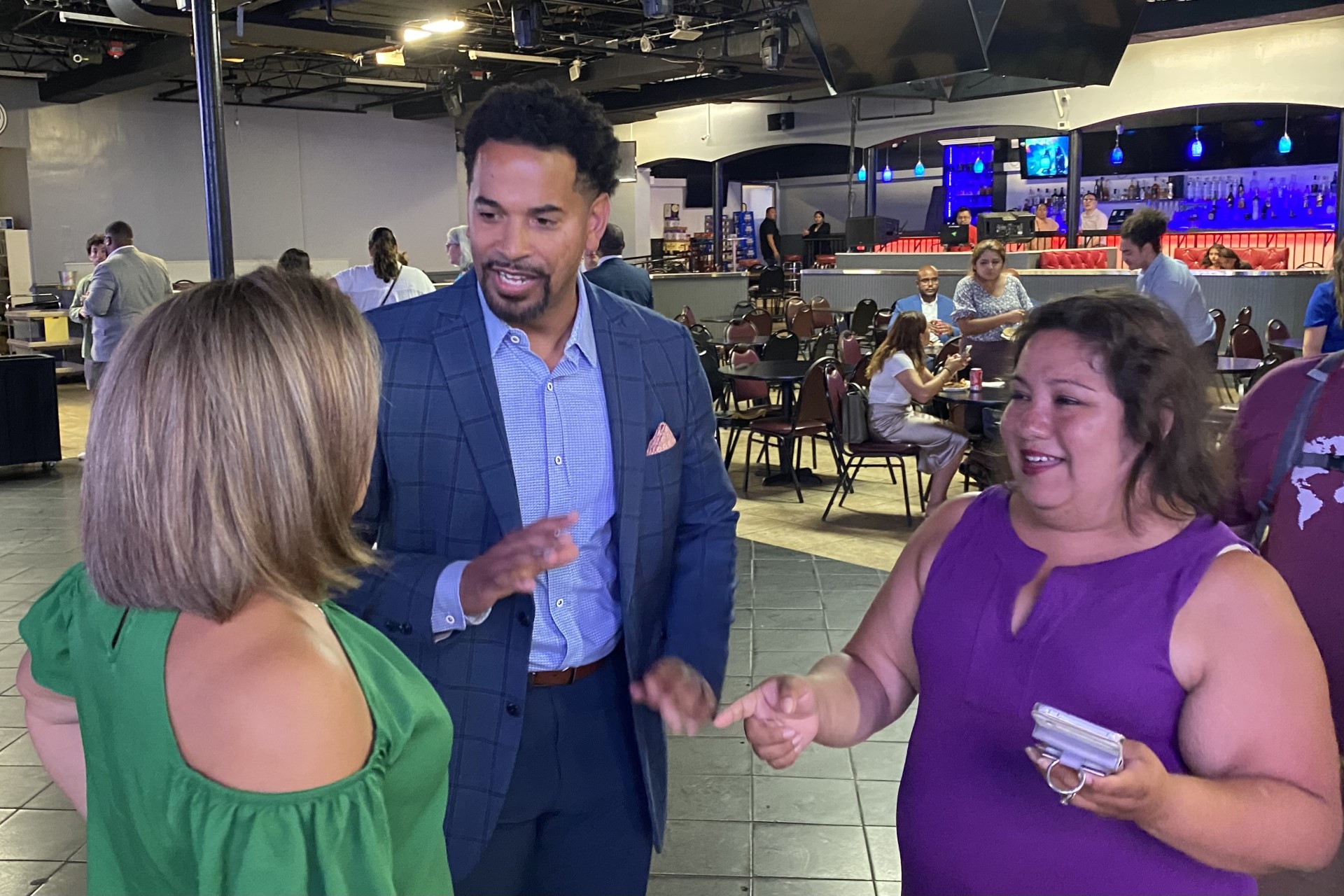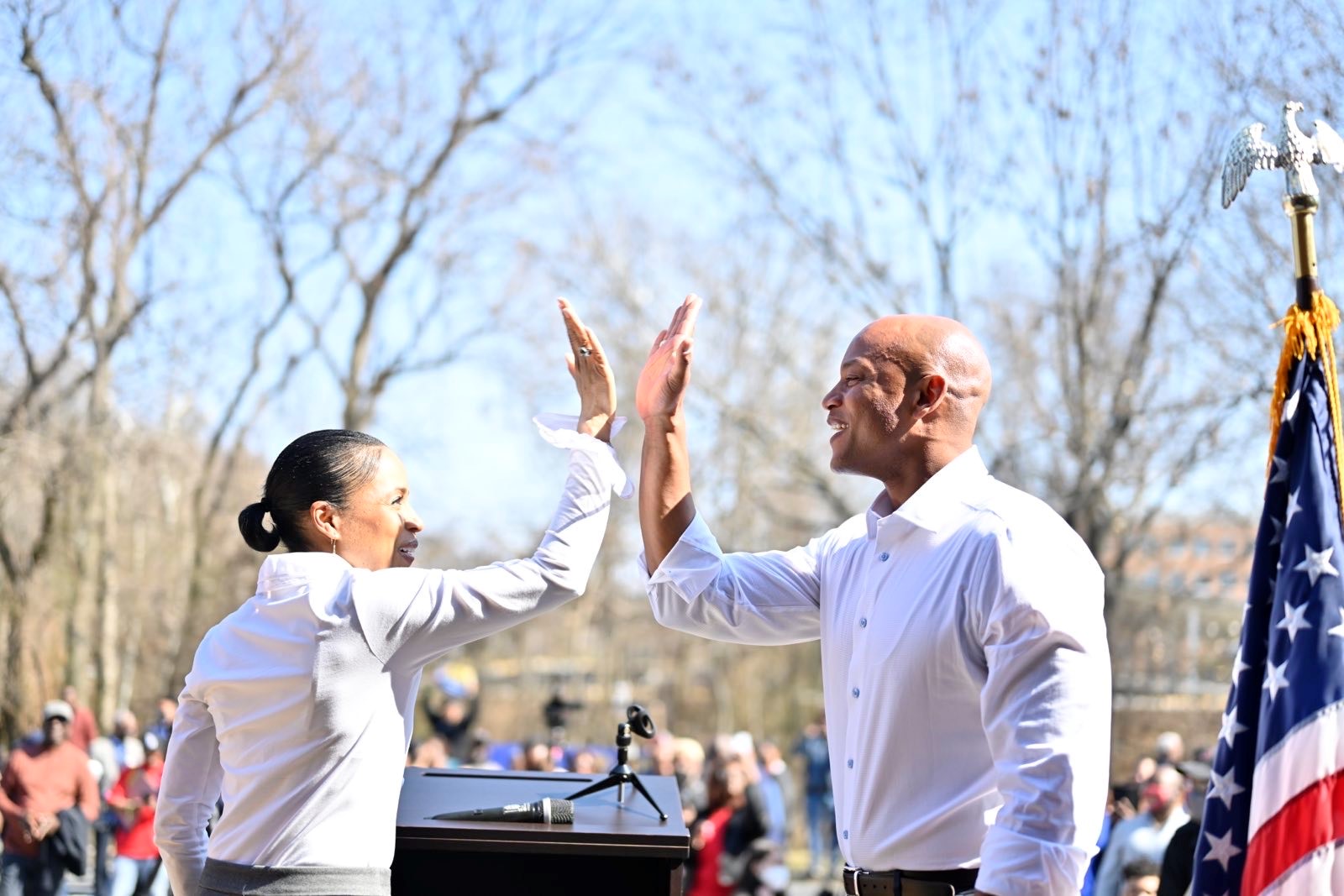News roundup: Jawando in Prince George’s, a poll on energy suppliers, climate group’s lobbyist list goes live, and more

Montgomery County Councilmember and U.S. Senate candidate Will Jawando (D) traveled across the border to neighboring Prince George’s County Thursday evening to tell a few stories.
One of those dealt with Jawando’s family background — his father immigrated to the United States to escape a civil war in Nigeria.
“What is America, if not a place that welcomes people fleeing violence?” he said Thursday. “That’s when America is at her best. It welcomes people who need help.”
Jawando presented his message of immigration and hope at a meeting of the Latino Democrats of Prince George’s County, at Mexico Lindo restaurant in Bladensburg.
Jawando, elected in 2018 in the state’s largest jurisdiction, also emphasized he’s the only candidate in the race who has worked in the Senate on Capitol Hill, for then-Sen. Barack Obama and current Sen. Sherrod Brown (D-Ohio).
On Thursday, Jawando became the second Senate candidate to appear before the Latino organization.
Rep. David Trone (D-6th), also from Montgomery County, visited Prince George’s on June 6 to make his case to the Latino Democrats. His pitch included how his company, the national liquor store chain Total Wine & More, hired more than 1,000 formerly incarcerated people.
The woman Jawando and Trone are trying to defeat in the Democratic primary, Prince George’s County Executive Angela Alsobrooks, has garnered the most endorsements from fellow elected officials, and her campaign has said she’s raised about $1.7 million in seven weeks.
If Alsobroooks wins the Democratic nomination in next year’s primary and then the general election, she would become the state’s first Black senator and the third Black woman to serve in the Senate. She has yet to appear before the Latino Democratic Club since becoming a candidate for Senate.
At least one Prince George’s voter isn’t supporting the county executive next year, preferring Jawando.
“He has his finger on the pulse,” said Patricia Washington, of Cheverly. “We don’t need a learning curve getting into the Senate. We need people who have already seen, lived and bring those experiences to bear. [Jawando’s] my next senator. Mark my words today.”
Maryland Democrats continue to wait on a decision from Rep. Jamie Raskin (D-8th) on whether he will seek the Senate seat or stay in the House. Raskin currently serves as the top Democrat on the House Oversight and Reform Committee.
Jerome Segal, a former college lecturer who has run for several offices, has said he will seek the Democratic nomination.
Anne Arundel County businessman Juan Dominguez may also enter the Democratic primary race.
The Prince George’s Latino group plans to host a forum for Democratic Senate candidates on Sept. 30. The time and location are still under discussion.
Poll shows strong support for competition in energy markets
Maryland consumers have had the option of choosing their gas and electric suppliers since the state deregulated the utility industry in the late 1990’s. But the system came with a fail-safe of sorts: If ratepayers don’t pick the supplier of their choice, the gas and electricity will be supplied automatically by the monopoly utility companies, which also deliver the energy to customers’ homes.
Effectively, it puts Maryland awkwardly in two categories: Deregulated but not fully deregulated, as Texas and some Southern states are. And there have been endless debates about whether the system is effective, amid highly-publicized reports that illuminate the predatory practices of some vendors that supply power at one rate, only to demand dramatic increases later in the contract.
Nevertheless, a coalition of energy companies, including NRG Energy, the massive Texas-based power supplier, has been pushing for greater competition in Maryland — and an end to “standard offer service,” the default mechanism that enables utilities to become the primary provider. In 2021, then-Del. Kathleen M. Dumais (D-Montgomery) offered legislation to open up the market to more competition, acknowledging that her bill was designed to start a conversation on the topic as much as anything else. It predictably died in the House Economic Matters Committee, where she was then the vice chair (she’s now a judge), but hasn’t been revived since.
But hope springs eternal, and this week, the Maryland Choose Who You Use Coalition, a 501c4 advocacy organization, is out with a poll showing that Maryland consumers favor more competition in the gas and electric supply margins. By a lot.
The coalition paid to query voters in the latest statewide poll conducted May 30-June 6 by Gonzales Research and Media Services, the independent polling firm in Arnold. The poll of 841 likely 2024 general election voters had a 3.5-point margin of error.
The pollster fashioned this question: “More than 80% of households in Maryland are involuntarily connected to their local utility, without knowing other energy providers and alternative energy sources are even available. Do you agree or disagree that Maryland should create true competition, where consumers can choose their own energy providers and select renewable energy sources?”
To that question, 78.5% of voters answered yes, 16.6% said no, and 4.9% had no answer. Significantly, 54.9% of the voters surveyed said they strongly agreed. And while support was fairly consistent across the board, it was highest among young voters (83.8%), Black voters (81.6%) and self-identified progressive voters (93.2%).
“These poll numbers are hard to ignore,” said Democratic strategist Len Foxwell, who is advising the coalition.
Foxwell said the group plans to take the poll results to policymakers and other stakeholders and try to build momentum for a possible legislative push in the 2024 General Assembly session. He noted that the state’s political climate — and leadership — is different than it was in 2021.
“Our intent is to share this information with our state’s elected officials, thought leaders and other stakeholders, many of whom are settling into new roles who will hopefully be more receptive to these issues than their predecessors had been before,” he said.
Climate group’s lobbyist website debuts
Last week, Maryland Matters reported on a new national climate organization, F Minus, which is targeting lobbying firms in state capitals that represent the fossil fuel industry and clean energy entities. This week, the group’s website and 50-state database of registered lobbyists went live.
“Is your lobbyist failing on climate?” the group asks on its homepage. “Research by F Minus reveals more than 1,500 state-level lobbyists who are playing both sides of the climate crisis by working for the fossil fuel industry at the same time they are working for people, communities, schools, businesses, nonprofit organizations and others being harmed by the crisis.”
F Minus was launched by James Browning, who ran the good government organization Common Cause Maryland from 2001 to 2005.
Using registration data from 2022, the database tags fossil fuel lobbyists by other sectors that they also represent, including agriculture, arts, clean energy, education, finance, government, health care, hospitality, insurance, legal, nonprofits, philanthropy, skiing, sports, tech, utilities, and more than 80 others.
According to F Minus, cities that have moved to divest from fossil fuels but continue to employ fossil fuel lobbyists include Baltimore, Chicago, Los Angeles, New Orleans, Pittsburgh, and Philadelphia. More than 150 colleges and universities employed fossil fuel lobbyists, including many higher education institutions that have moved to divest from fossil fuels.
“Organizations advocating for climate action deserve to know whether their consultants are collaborating with the companies responsible for the climate emergency,” said Duncan Meisel, executive director of Clean Creatives, a coalition of creative professionals working to combat climate change. “The F Minus database provides a crucial tool to anyone working for clean air and a safe climate, and a clear warning to lobbyists that it is time to pick a side in the fight for our future. The future of our economy lies in clean energy and climate justice, and we need advocates and agencies to make it a reality — not work with polluters to obstruct action.”
Segal’s utopian tome
Segal, the retired college lecturer, peace activist and founder of the now-defunct Bread and Roses socialist party who is seeking the Democratic nomination for U.S. Senate, can add a new title to his résumé: Published novelist.
Segal has just published an autobiographical novel called “85 Rochdale Road — The Novel.”
According to a spokesperson, the novel “focuses on the lasting impact that a small utopian socialist community north of New York City had on his family. When Segal was growing up, Norman Thomas, the socialist leader who ran for President six times, visited the community each summer to deliver the Labor Day speech. When Segal was 19 years old and about to head off to Europe, Thomas provided him with a letter of introduction to the socialist heads of state.”
A blurb on the Barnes & Nobel website described it this way: “Forty miles north of New York, at 85 Rochdale Road, there sits a tiny cottage, in a utopian summer community, where Sam Teres spent his summers, far from home and family back in the Bronx. Owned by his maiden aunt, the cottage is the scene of a life-imprinting drama of love and loneliness, of fathers and sons, of passion, work and money.
“A psychological and autobiographic novel, 85 Rochdale Road is Sam’s quest as he seeks to unravel the labyrinth of his youth, and comprehend what really happened, living between two different families that inhabited two different worlds.”
Thus far, Segal has run unsuccessfully for governor (2022), president (2020) and U.S. Senate (2018).





 Creative Commons Attribution
Creative Commons Attribution